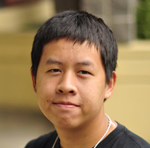Editor’s note: This story was written by a high school student in Northwest Asian Weekly Foundation’s Summer Youth Leadership Program. This story is part of a special back-to-school issue.
By Michael Nguyen
SYLP STUDENT

Michael Nguyen
As a second generation Asian American from a family of refugees, I think it’s important to document my parents’ oral history. When I asked my dad what his experiences were like in fleeing his homeland, Vietnam, he readily opened up.
He first talked about why he thought of leaving in the first place — Communism, or North Vietnam, the eventual victors of the Vietnam War. My dad enlisted in the South Vietnamese Air Force at the age of 17. It was during this time that he had gained the necessary skills that would help him escape Vietnam.
During his two-and-a-half-year training, he learned to navigate using nothing but the stars and moon. Before my father could complete his training, the war had ended with Communist North Vietnam taking over. As soon as he heard that South Vietnam had lost, he knew it was time to escape. He was afraid of being sent to a POW camp, where he would be tortured.
My dad ran to his brother-in-law’s house because he owned a boat. My dad asked to use it in his escape to freedom. My dad’s brother-in-law quickly agreed, and my dad soon organized a group that would escape with him.
My dad gathered a group of 35 people. He loaded them onto a small 30-foot, rusted boat. As soon as they had left, my dad said the wind began to howl and the rain crashed down on top of the aluminum roof.
He was worried that the storm would capsize the boat and that they would never make it to their destination in Thailand. Fortunately, my dad safely navigated the group out of the storm.
It was my dad’s first time out in the open sea and as a captain. During the journey to Thailand, which took three days and two nights, he ran into pirates on five different occasions. Each time, he narrowly escaped trouble.
Once they landed in Thailand, everyone took a five-hour break. My dad decided to continue the journey to Malaysia. Although others had not wanted to leave, my dad was adamant because he felt Malaysia was a safer country.
Many people opposed this decision and fought with my dad during the five-day escape from Vietnam. My dad knew he had to be strong to lead. Once my dad gathered everyone back onto the boat, they traveled along the coast of Thailand, starting at 5 a.m. They reached Malaysia at 4 p.m.
It was then that the Malaysian government sent all of the refugees to Pulau Bidong, a small island. My dad and his group were named PB-561 for identification purposes.
After being sent to the refugee camp, American delegates interviewed my dad. Since he was in the Air Force, they approved him to resettle in the United States. Before he could immigrate, he learned English in the Philippines for six months.
My father arrived in America in 1983. He was offered welfare to live off of, but he believed that it was better to earn his own living instead of depending on the government that had taken him in.
He was sponsored by a farmer and was assigned to pick strawberries and blueberries.
Eventually, the farmer recognized my dad’s work ethic and asked a friend who owned a construction company to hire him. He worked as a laborer for five years before he was promoted to crew foreman. After many years and projects, he eventually made his way into his current position as an inspector for the City of Everett, working as hard as he did in his first job. ♦



